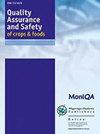Inhibition of Clostridium (C.) botulinum and its toxins by probiotic bacteria and their metabolites: An update review
IF 5.3
3区 农林科学
Q1 FOOD SCIENCE & TECHNOLOGY
引用次数: 18
Abstract
Clostridium (C.) botulinum is the causative agent of foodborne poisoning such as botulism, which includes high mortality rates in animals and humans. Probiotic bacteria play critically functional roles in food matrices, as well as agricultural, clinical and nutritional fields. In this review, potentials of various probiotic bacteria and their metabolites to prevent C. botulinum toxicity are reviewed. For this purpose, an introduction about C. botulinum and its mechanisms of action is provided. After a short introduction of probiotic bacteria and their beneficial health effects on humans, the bacterial mechanisms of their action are reviewed. Then bacteriocin production by probiotic bacteria is described. After description of C. botulinum and its neurotoxins, effects of probiotic bacteria on C. botulinum are reviewed with a special focus on effects of the bacterial bacteriocins on this pathogen. Furthermore, physicochemical factors, which show great effects on potential of nisin to prevent growth and toxin production of the bacteria, are introduced. This study has shown that probiotic bacteria and their bacteriocins can be effective on growth, toxin formation and toxicity of C. botulinum. In conclusion, probiotic use in food safety studies can be effective in preventing or treating toxicity of C. botulinum.益生菌及其代谢产物对肉毒梭菌及其毒素的抑制作用:最新综述
肉毒梭菌(C.)肉毒杆菌是肉毒中毒等食源性中毒的病原体,在动物和人类中造成高死亡率。益生菌在食品基质以及农业、临床和营养领域发挥着至关重要的作用。本文综述了各种益生菌及其代谢物预防肉毒杆菌毒性的潜力。为此,本文介绍了肉毒杆菌及其作用机制。在简要介绍了益生菌及其对人类健康的有益作用后,对其作用的细菌机制进行了综述。然后介绍了益生菌产生细菌素的方法。在介绍了肉毒杆菌及其神经毒素的基础上,综述了益生菌对肉毒杆菌的作用,重点介绍了细菌素对肉毒杆菌的作用。此外,还介绍了对nisin抑制细菌生长和产毒潜力有重要影响的理化因素。本研究表明,益生菌及其细菌素对肉毒杆菌的生长、毒素形成和毒性均有影响。综上所述,在食品安全研究中使用益生菌可以有效预防或治疗肉毒杆菌的毒性。
本文章由计算机程序翻译,如有差异,请以英文原文为准。
求助全文
约1分钟内获得全文
求助全文
来源期刊

Quality Assurance and Safety of Crops & Foods
FOOD SCIENCE & TECHNOLOGY-
CiteScore
4.60
自引率
7.50%
发文量
61
审稿时长
1 months
期刊介绍:
''Quality Assurance and Safety of Crops & Foods'' is an international peer-reviewed journal publishing research and review papers associated with the quality and safety of food and food sources including cereals, grains, oilseeds, fruits, root crops and animal sources. It targets both primary materials and their conversion to human foods. There is a strong focus on the development and application of new analytical tools and their potential for quality assessment, assurance, control and safety. The scope includes issues of risk assessment, traceability, authenticity, food security and socio-economic impacts. Manuscripts presenting novel data and information that are likely to significantly contribute to scientific knowledge in areas of food quality and safety will be considered.
''Quality Assurance and Safety of Crops & Foods'' provides a forum for all those working in the specialist field of food quality and safety to report on the progress and outcomes of their research.
 求助内容:
求助内容: 应助结果提醒方式:
应助结果提醒方式:


